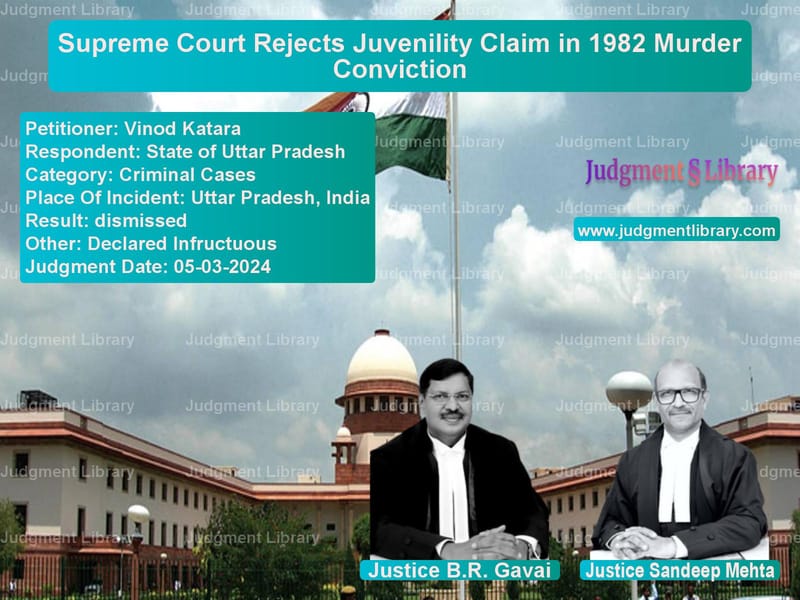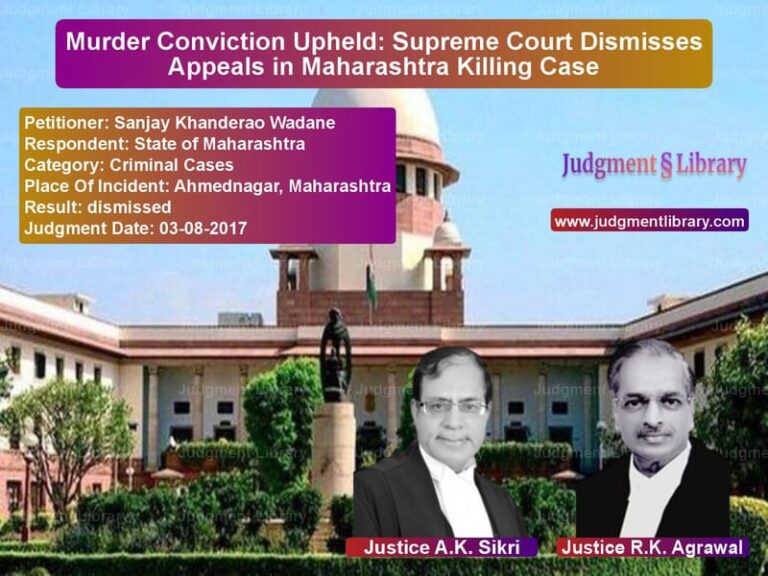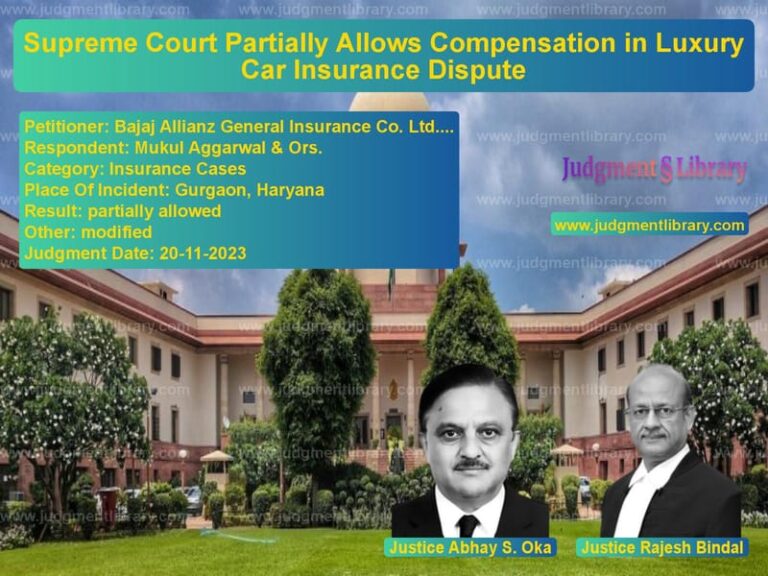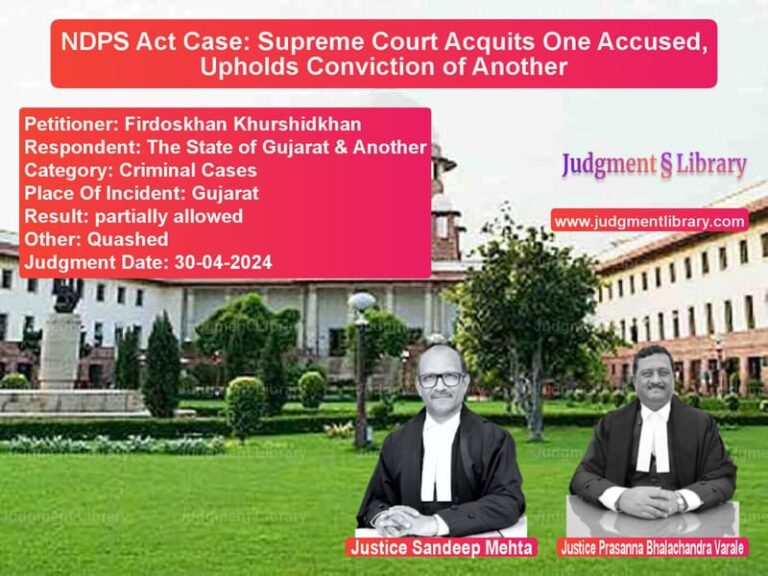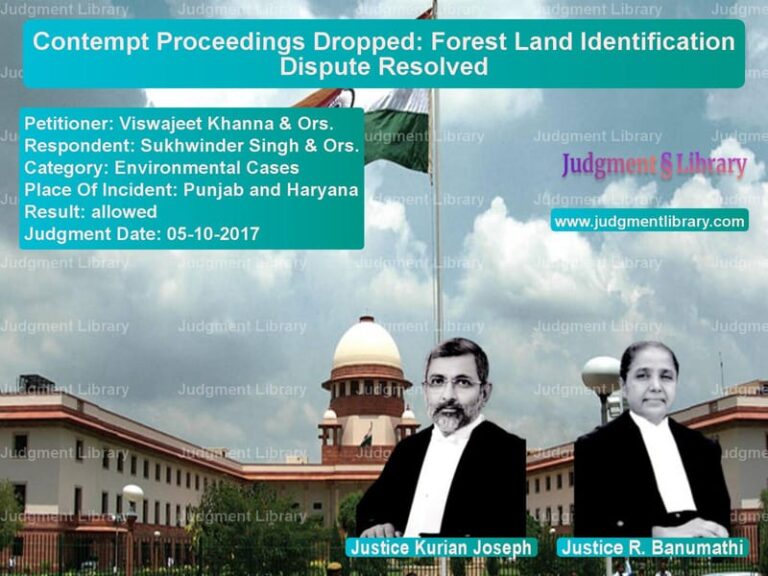Supreme Court Rejects Juvenility Claim in 1982 Murder Conviction
The Supreme Court of India recently ruled in the case of Vinod Katara v. State of Uttar Pradesh, addressing a long-pending dispute regarding the appellant’s claim of juvenility at the time of committing a murder in 1982. The Court dismissed the petition, upholding previous findings that the appellant was an adult at the time of the offense. This judgment sets a precedent in cases where juvenility claims are raised decades after conviction.
Background of the Case
The case originates from a murder committed on September 10, 1982, for which the appellant, Vinod Katara, was convicted under Section 302 read with Section 34 of the Indian Penal Code (IPC). He was sentenced to life imprisonment by the trial court on January 6, 1986. The appellant, along with three co-accused, filed a criminal appeal before the Allahabad High Court, which was dismissed on March 4, 2016. Following this, the appellant filed a Special Leave Petition (SLP) before the Supreme Court, which was also dismissed on August 16, 2016.
In 2012, the Allahabad High Court directed Juvenile Justice Boards (JJBs) across Uttar Pradesh to examine the possibility of juvenility for convicts who were still in jail. Pursuant to this order, the appellant’s age was medically examined, and he subsequently claimed that he was around 15 years old at the time of the incident. He filed a writ petition before the Supreme Court, seeking a declaration of his juvenility and appropriate relief.
Petitioner’s Arguments
The appellant, represented by senior counsel, argued the following:
- The Medical Board’s ossification test conducted on December 10, 2021, estimated his age at around 56 years at that time, indicating that he was approximately 15 years old in 1982.
- Under the Juvenile Justice (Care and Protection of Children) Act, 2015 (JJ Act), a person found to have been a juvenile at the time of the offense is entitled to relief.
- The family register, school records, and other documents supported his claim of being born in 1968, making him a minor at the time of the crime.
- The principle of beneficial interpretation should be applied, considering the humanitarian aspect of the JJ Act.
Respondent’s Arguments
The State of Uttar Pradesh opposed the claim of juvenility on the following grounds:
- The Additional District and Sessions Judge, Agra, conducted a detailed inquiry and found that the appellant’s actual date of birth was July 2, 1960, making him an adult at the time of the offense.
- The family register submitted by the appellant was forged and unreliable.
- The school admission register recorded his date of birth as July 2, 1960, which was supported by witness testimony.
- Medical age determination beyond 25 years is unreliable and cannot override documentary evidence.
Supreme Court’s Observations
The Supreme Court meticulously analyzed the evidence and found significant discrepancies in the appellant’s claim. The key observations included:
- Documentary Evidence Overrules Medical Test: The Court held that when school records and official documents provide a clear date of birth, they take precedence over medical age determination, which is approximate.
- Forgery in Family Register: The inquiry revealed that the appellant had attempted to alter the records to show a later birth date.
- Delayed Claim of Juvenility: The appellant had never raised the issue of juvenility in his trial, appeal, or even during the SLP before the Supreme Court, which raised doubts about the authenticity of his claim.
- Legal Precedent on Age Determination: The Court reiterated that the JJ Act prioritizes school records over ossification tests, as age determination based on medical tests becomes uncertain beyond 25 years.
Key Judicial Remarks
In dismissing the petition, the Supreme Court made the following remarks:
“The estimation of age based on X-ray examination becomes uncertain after the age of 25 years. Where contemporaneous documentary evidence is available, such as school records, it must be given greater weight.”
On the issue of fabricated documents, the Court stated:
“The family register produced by the petitioner is not authentic but a document doubtful in nature which does not appear to be a credible document.”
The Court also emphasized the importance of timely claims:
“A claim of juvenility must be raised at the earliest possible stage. It cannot be an afterthought made decades after conviction.”
Final Judgment
The Supreme Court ruled:
- The writ petition was dismissed.
- The appellant was found to be an adult at the time of the offense.
- The previous convictions and sentence of life imprisonment were upheld.
- The inquiry report submitted by the Additional District and Sessions Judge was accepted as conclusive.
Conclusion
This ruling reinforces the importance of documentary evidence in age determination cases and prevents misuse of the JJ Act to evade criminal liability. The Court’s decision ensures that delayed claims of juvenility, particularly in serious offenses like murder, are scrutinized thoroughly to prevent injustice.
Petitioner Name: Vinod Katara.Respondent Name: State of Uttar Pradesh.Judgment By: Justice B.R. Gavai, Justice Sandeep Mehta.Place Of Incident: Uttar Pradesh, India.Judgment Date: 05-03-2024.
Don’t miss out on the full details! Download the complete judgment in PDF format below and gain valuable insights instantly!
Download Judgment: vinod-katara-vs-state-of-uttar-prade-supreme-court-of-india-judgment-dated-05-03-2024.pdf
Directly Download Judgment: Directly download this Judgment
See all petitions in Juvenile Justice
See all petitions in Public Interest Litigation
See all petitions in Legal Malpractice
See all petitions in Judgment by B R Gavai
See all petitions in Judgment by Sandeep Mehta
See all petitions in dismissed
See all petitions in Declared Infructuous
See all petitions in supreme court of India judgments March 2024
See all petitions in 2024 judgments
See all posts in Criminal Cases Category
See all allowed petitions in Criminal Cases Category
See all Dismissed petitions in Criminal Cases Category
See all partially allowed petitions in Criminal Cases Category

